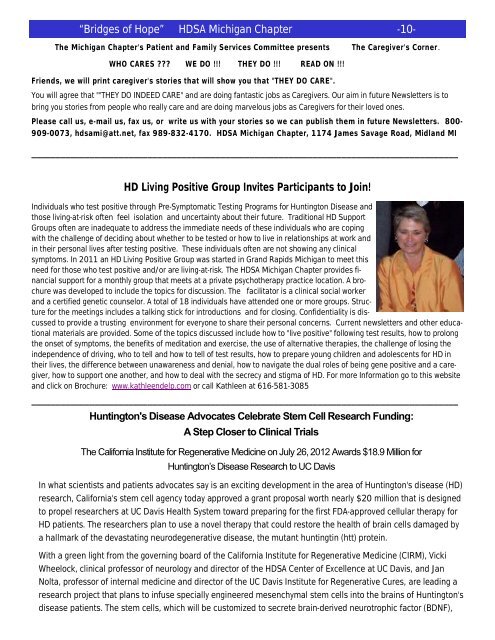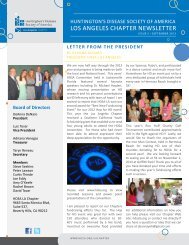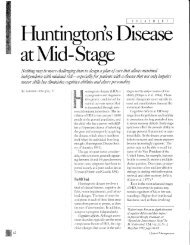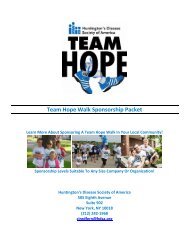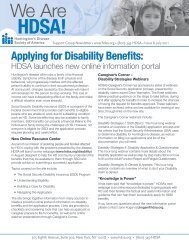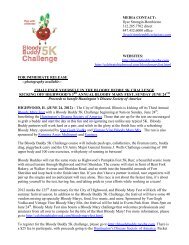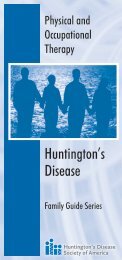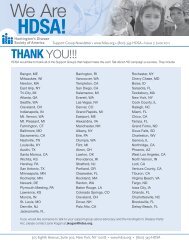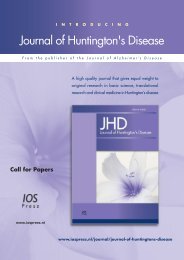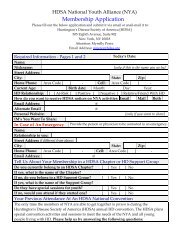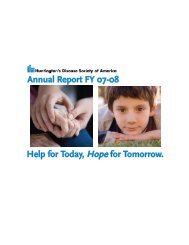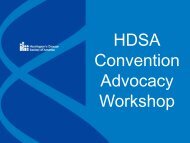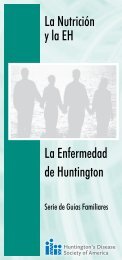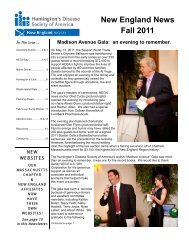February 2013 - Huntington's Disease Society of America
February 2013 - Huntington's Disease Society of America
February 2013 - Huntington's Disease Society of America
Create successful ePaper yourself
Turn your PDF publications into a flip-book with our unique Google optimized e-Paper software.
“Bridges <strong>of</strong> Hope” HDSA Michigan Chapter -10-<br />
The Michigan Chapter's Patient and Family Services Committee presents<br />
The Caregiver's Corner.<br />
WHO CARES ??? WE DO !!! THEY DO !!! READ ON !!!<br />
Friends, we will print caregiver's stories that will show you that "THEY DO CARE".<br />
You will agree that ""THEY DO INDEED CARE" and are doing fantastic jobs as Caregivers. Our aim in future Newsletters is to<br />
bring you stories from people who really care and are doing marvelous jobs as Caregivers for their loved ones.<br />
Please call us, e-mail us, fax us, or write us with your stories so we can publish them in future Newsletters. 800-<br />
909-0073, hdsami@att.net, fax 989-832-4170. HDSA Michigan Chapter, 1174 James Savage Road, Midland MI<br />
________________________________________________________________________________________<br />
HD Living Positive Group Invites Participants to Join!<br />
Individuals who test positive through Pre-Symptomatic Testing Programs for Huntington <strong>Disease</strong> and<br />
those living-at-risk <strong>of</strong>ten feel isolation and uncertainty about their future. Traditional HD Support<br />
Groups <strong>of</strong>ten are inadequate to address the immediate needs <strong>of</strong> these individuals who are coping<br />
with the challenge <strong>of</strong> deciding about whether to be tested or how to live in relationships at work and<br />
in their personal lives after testing positive. These individuals <strong>of</strong>ten are not showing any clinical<br />
symptoms. In 2011 an HD Living Positive Group was started in Grand Rapids Michigan to meet this<br />
need for those who test positive and/or are living-at-risk. The HDSA Michigan Chapter provides financial<br />
support for a monthly group that meets at a private psychotherapy practice location. A brochure<br />
was developed to include the topics for discussion. The facilitator is a clinical social worker<br />
and a certified genetic counselor. A total <strong>of</strong> 18 individuals have attended one or more groups. Structure<br />
for the meetings includes a talking stick for introductions and for closing. Confidentiality is discussed<br />
to provide a trusting environment for everyone to share their personal concerns. Current newsletters and other educational<br />
materials are provided. Some <strong>of</strong> the topics discussed include how to "live positive" following test results, how to prolong<br />
the onset <strong>of</strong> symptoms, the benefits <strong>of</strong> meditation and exercise, the use <strong>of</strong> alternative therapies, the challenge <strong>of</strong> losing the<br />
independence <strong>of</strong> driving, who to tell and how to tell <strong>of</strong> test results, how to prepare young children and adolescents for HD in<br />
their lives, the difference between unawareness and denial, how to navigate the dual roles <strong>of</strong> being gene positive and a caregiver,<br />
how to support one another, and how to deal with the secrecy and stigma <strong>of</strong> HD. For more Information go to this website<br />
and click on Brochure: www.kathleendelp.com or call Kathleen at 616-581-3085<br />
________________________________________________________________________________________<br />
<strong>Huntington's</strong> <strong>Disease</strong> Advocates Celebrate Stem Cell Research Funding:<br />
A Step Closer to Clinical Trials<br />
The California Institute for Regenerative Medicine on July 26, 2012 Awards $18.9 Million for<br />
Huntington’s <strong>Disease</strong> Research to UC Davis<br />
In what scientists and patients advocates say is an exciting development in the area <strong>of</strong> <strong>Huntington's</strong> disease (HD)<br />
research, California's stem cell agency today approved a grant proposal worth nearly $20 million that is designed<br />
to propel researchers at UC Davis Health System toward preparing for the first FDA-approved cellular therapy for<br />
HD patients. The researchers plan to use a novel therapy that could restore the health <strong>of</strong> brain cells damaged by<br />
a hallmark <strong>of</strong> the devastating neurodegenerative disease, the mutant huntingtin (htt) protein.<br />
With a green light from the governing board <strong>of</strong> the California Institute for Regenerative Medicine (CIRM), Vicki<br />
Wheelock, clinical pr<strong>of</strong>essor <strong>of</strong> neurology and director <strong>of</strong> the HDSA Center <strong>of</strong> Excellence at UC Davis, and Jan<br />
Nolta, pr<strong>of</strong>essor <strong>of</strong> internal medicine and director <strong>of</strong> the UC Davis Institute for Regenerative Cures, are leading a<br />
research project that plans to infuse specially engineered mesenchymal stem cells into the brains <strong>of</strong> <strong>Huntington's</strong><br />
disease patients. The stem cells, which will be customized to secrete brain-derived neurotrophic factor (BDNF),


